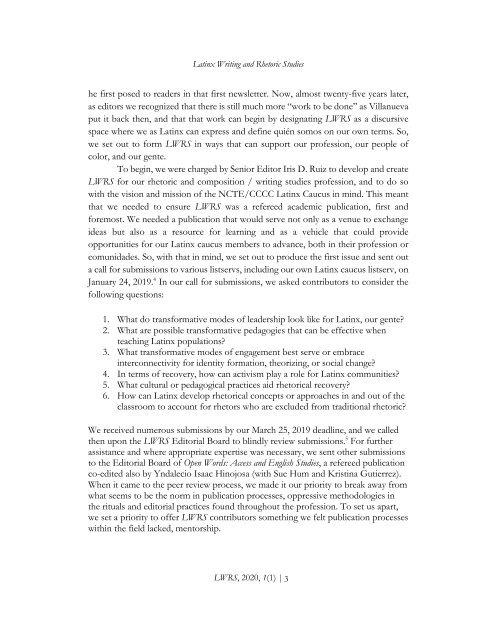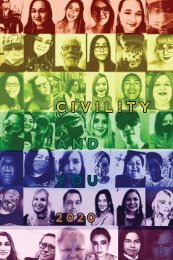LWRS June 2020 Volume 1, Issue 1
Inaugural Issue co-edited by Yndalecio Isaac Hinojosa and Isabel Baca
Inaugural Issue co-edited by Yndalecio Isaac Hinojosa and Isabel Baca
You also want an ePaper? Increase the reach of your titles
YUMPU automatically turns print PDFs into web optimized ePapers that Google loves.
Latinx Writing and Rhetoric Studies<br />
he first posed to readers in that first newsletter. Now, almost twenty-five years later,<br />
as editors we recognized that there is still much more “work to be done” as Villanueva<br />
put it back then, and that that work can begin by designating <strong>LWRS</strong> as a discursive<br />
space where we as Latinx can express and define quién somos on our own terms. So,<br />
we set out to form <strong>LWRS</strong> in ways that can support our profession, our people of<br />
color, and our gente.<br />
To begin, we were charged by Senior Editor Iris D. Ruiz to develop and create<br />
<strong>LWRS</strong> for our rhetoric and composition / writing studies profession, and to do so<br />
with the vision and mission of the NCTE/CCCC Latinx Caucus in mind. This meant<br />
that we needed to ensure <strong>LWRS</strong> was a refereed academic publication, first and<br />
foremost. We needed a publication that would serve not only as a venue to exchange<br />
ideas but also as a resource for learning and as a vehicle that could provide<br />
opportunities for our Latinx caucus members to advance, both in their profession or<br />
comunidades. So, with that in mind, we set out to produce the first issue and sent out<br />
a call for submissions to various listservs, including our own Latinx caucus listserv, on<br />
January 24, 2019. 4 In our call for submissions, we asked contributors to consider the<br />
following questions:<br />
1. What do transformative modes of leadership look like for Latinx, our gente?<br />
2. What are possible transformative pedagogies that can be effective when<br />
teaching Latinx populations?<br />
3. What transformative modes of engagement best serve or embrace<br />
interconnectivity for identity formation, theorizing, or social change?<br />
4. In terms of recovery, how can activism play a role for Latinx communities?<br />
5. What cultural or pedagogical practices aid rhetorical recovery?<br />
6. How can Latinx develop rhetorical concepts or approaches in and out of the<br />
classroom to account for rhetors who are excluded from traditional rhetoric?<br />
We received numerous submissions by our March 25, 2019 deadline, and we called<br />
then upon the <strong>LWRS</strong> Editorial Board to blindly review submissions. 5 For further<br />
assistance and where appropriate expertise was necessary, we sent other submissions<br />
to the Editorial Board of Open Words: Access and English Studies, a refereed publication<br />
co-edited also by Yndalecio Isaac Hinojosa (with Sue Hum and Kristina Gutierrez).<br />
When it came to the peer review process, we made it our priority to break away from<br />
what seems to be the norm in publication processes, oppressive methodologies in<br />
the rituals and editorial practices found throughout the profession. To set us apart,<br />
we set a priority to offer <strong>LWRS</strong> contributors something we felt publication processes<br />
within the field lacked, mentorship.<br />
<strong>LWRS</strong>, <strong>2020</strong>, 1(1) | 3





